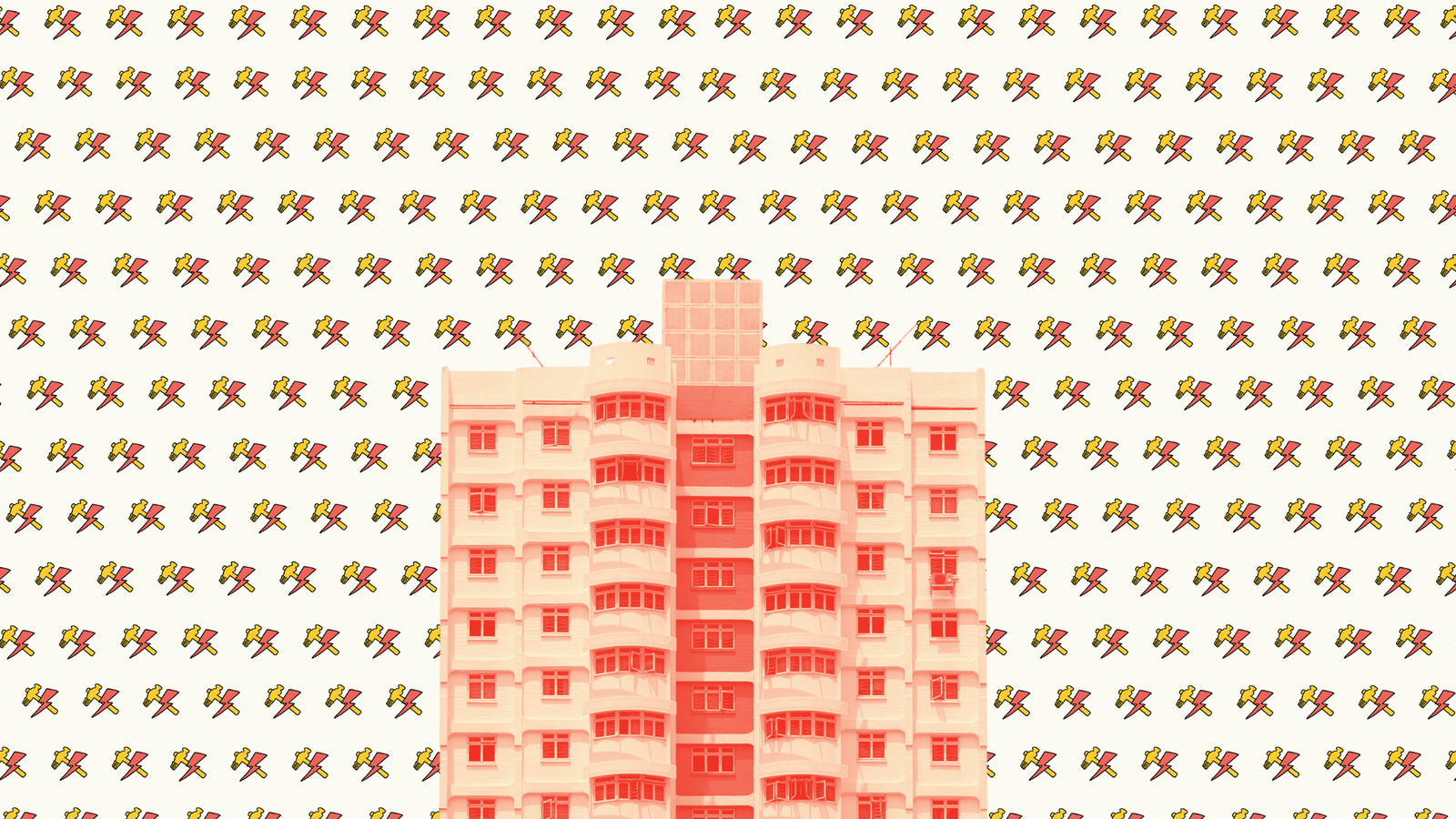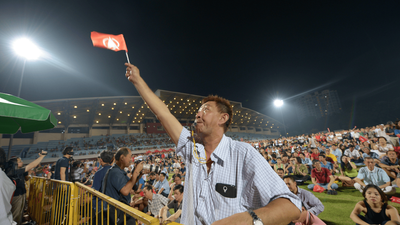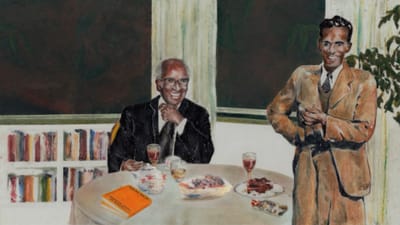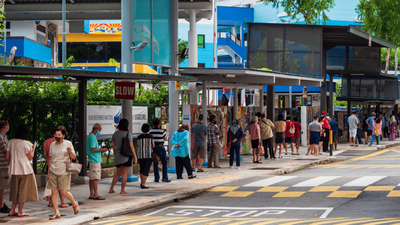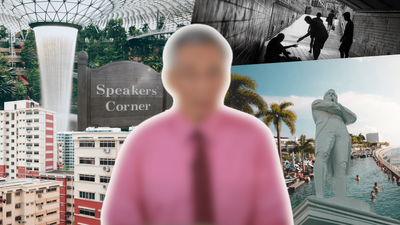On February 24th, Leon Perera, a Workers’ Party (WP) member of parliament (MP), stood up in Parliament to make an impassioned plea. “The [ruling] People’s Action Party (PAP) seems to be doubling down on this incorrect assertion, using its tremendous PR and communicative machinery.”
The PAP’s claim, repeated relentlessly for weeks, is that Singapore’s housing shortage would be worse if the government had listened to the WP. Its 2019 housing paper had apparently recommended a reduction in the annual supply of new build-to-order (BTO) public housing flats.
Perera, with a background in consulting, often combines sharp analysis with urgent, precise rhetoric. He is one of the few politicians to have ever left the redoubtable K Shanmugam, minister for law and home affairs, at a loss for words, during the debate on The Protection from Online Falsehoods and Manipulation Act 2019 (POFMA).
“It says ‘BTO projects should continue’,” Perera said, his right index finger dotting the dry parliamentary air, left to right, as if poking at words. “I repeat, ‘BTO projects should continue’. It doesn’t say ‘BTO projects should continue at a reduced rate’. It doesn’t say ‘BTO projects should stop’. It doesn’t say B-”
Perera was himself then forced to stop, by loud guffawing from across the aisle, as PAP ministers couldn’t help themselves. “You laugh…you laugh.” Gone was the pointed finger; his palms were open, up in the air. The meticulous consultant had just realised he was the court jester. Perera pleaded with them to stop propagating what he called falsehoods.
“Let’s not belabour this any more,” replied Lawrence Wong, the deputy prime minister who’s slated for the top job. He must have felt the glare of the party’s arch-conservatives, watching their young padawan’s every tai chi move, for Wong then repeatedly stumbled. “I think, we will just, might as well, just publish without, what, exactly verbatim whatever the Workers’ Party has said in the working paper in 2019, and in the end Singaporeans will be the judge of the matter.” The PAP’s Facebook page then quoted the WP’s entire passage, including the key phrase, “BTO projects should continue.”
Yet one of the PAP’s grizzled old warriors didn’t get the memo. On February 26th, just two days after Perera’s speech, Teo Chee Hean, senior minister, attended an Edusave awards ceremony in Pasir Ris, the constituency he’s represented since 1997. According to attendees, he brashly repeated this assertion. “In 2019, WP asked govt to reduce new flat supply to avoid oversupply,” screamed one presentation slide. Never mind doubling down, this was tripling down, on home ground. Young school children had to spend their Sunday morning in uniform listening to PAP hymns.
Given Singapore’s spiralling property prices and rents, housing is almost certainly going to be the main issue at the next general elections, due by 2025. The letters “BTO” are regularly emblazoned on the front page of The Straits Times (ST). It’s important that Singaporeans understand every party’s position on the matter. However, this back-and-forth has played out in the newspapers and social media for the better part of February, without any clear conclusion.
Jom has therefore decided to scrutinise both the comments by the PAP and the WP’s 2019 housing paper. In particular, we looked for mentions in other passages that might support the PAP’s contention.
Our conclusion is that the PAP has certainly misrepresented the WP. We have no way of knowing whether it was deliberate. Whatever the case, it warrants, in our view, immediate corrections and an apology—which will allow the PAP to demonstrate to the electorate its commitment to fair discourse.
The brouhaha began a month ago. On February 7th, Desmond Lee, minister for national development, made a speech in Parliament defending the government’s housing development record. He was responding in part to suggestions from several MPs that Singapore should build BTO flats ahead of demand, part of a larger push for more affordable housing.
Lee delivered several sound counter-arguments with aplomb. “Before Covid-19 struck, the data, in terms of application rates across the board as well as resale prices, indicated that the housing market was relatively stable.” Nobody would have expected the pandemic to spark a property boom, Lee went on, contrasting it with the fallout from the Asian Financial Crisis, when the market crashed.
These arguments would resonate with most Singaporeans. His misrepresentation of parliamentary colleagues wouldn’t. With dramatic pauses and melody, Lee read from a subsection of the WP paper, published pre-Covid in 2019, titled “Calibrating the construction of new BTO estates” (p.47):
Resident population growth has been approximately 30,000 a year since 2010 and 2011. Assuming an average household size of 3.3, this would mean that around 9,000 or so new dwelling units are required annually. Completions within the same time period have far exceeded the resident population growth. Private vacancies have only started to inch down, but there are still around 12,000 private units completing up to 2022. Will the HDB have a vacancy rate problem, compounded by a still steady stream of 16,000 to 17,000 BTO units in the last few years, which will continue to increase supply up to 2022?
Lee stopped there, ignoring the very next line.
BTO projects should continue, but, rather than creating too many new towns, planners would do well to consider, in future, partly meeting demand from new family formation by selling balance flats in mature estates acquired under the Universal Sale and Lease Back scheme or USB (see previous chapter). This would help advance urban renewal in the mature estates where many Singapore [sic] desire to live, since these are nearer to the city centre.
There are two paragraphs in this subsection. Lee read out to Parliament only the first, which outlines the risks and queries, but not the second, which conveys the proposed action.
“Had we tapered down our supply to the Workers’ Party’s levels in 2019, or listened to you and your experts,” Lee said, snidely, “I think our BTO shortage would be even greater today.”
Was it a calculated ploy to smear the WP as foolish? Or did Lee and his team just completely miss the second paragraph? Perhaps it just reflects an inability to juggle contradictory thoughts.
Mum: “Do we really want to make biryani for 16 people? What if only nine show up? We’d be stuck with lots of biryani. OK, never mind, let’s go with your plan.”
Dad: “You said make biryani for nine people.”
Even though Louis Chua of the WP, who was involved in the paper's production, immediately rebutted Lee, the PAP party machinery had already geared up for action. The next day, Petir.sg, which calls itself a “socio-political website of the PAP”, published the video of Lee’s speech, titled, “In 2019, the Workers’ Party called for the PAP Govt to build fewer HDB flats.”
On February 11th, Xie Yao Quan, a PAP MP, published a letter in Lianhe Zaobao, the Chinese paper, repeating the misrepresentation. On February 14th, so did Henry Kwek, another PAP MP, in ST. Both papers published rebuttals from the WP and then counter-rebuttals from the PAP. However, they should have just caught and corrected the initial misrepresentation, rather than permit public mudslinging that poisons discourse and exacerbates polarisation.
Teo’s performance at the Edusave event was perhaps the most objectionable. Not only did it come after the seeming truce in Parliament, but it occurred at an event for children that’s funded by the taxpayer and not the PAP. (Note: Lee, Kwek and Teo did not respond to requests for comment. In particular, Jom had asked Teo to share his Edusave slide deck so we could better contextualise his presentation.)
Was there anything at all in the WP paper that might support the PAP’s position? Not in our view. To be sure, one recurring theme is around the long-term risks of depressed resale prices, but all in the context of housing as a nest egg. Consider this passage (p.11):
Growing the BTO supply with flats at 99-year leases while population growth is slow and the society is aging tends to lead to a tipping point when HDB resale prices start to decline, eroding retirement adequacy and bequest values while generating capital losses for some.
This points to a deeper, more philosophical misunderstanding and misrepresentation of the WP paper. It’s written with a long-term, 99-year view on housing supply, retirement adequacy, and urban renewal, among other things. The PAP plucked out one bit and assumed it was a short-term recommendation.
Environmentalist: “We need to reduce emissions by 2050.”
Government: “You want me to ban gasoline cars tomorrow?”
The paper does have a list of policy proposals (p.58) though nowhere was the WP calling for—or, in Lee’s words, “recommending”—a reduced public housing construction rate. Overall, it raises important questions. Is Singapore’s traditional home ownership model broken? Should society place less emphasis on owning and more on renting? How will Singapore square the contradiction between retirement adequacy through a housing asset and the fact that that asset will eventually be worth nothing (when its lease expires)?
Perhaps the good thing for the WP is that more Singaporeans (including Jom) will now be forced to take a closer look at its interesting, more socialistic housing proposals, including a Public Rental market scheme. This is not to imply that the WP’s housing proposals are necessarily preferable to the PAP’s. But it’s good that Singaporeans have alternatives leading up to the next election.
Whether or not the PAP’s misrepresentations constitute “falsehoods”, as Perera alleged, is not something Jom can determine. The POFMA office does have instructions on how to report potential falsehoods. One would first have to identify the relevant ministry and report it, following which the minister there “...may instruct the POFMA Office to issue a direction if there is an online falsehood and it is in the public interest to do so.”
Since this concerns public housing, it would be the Ministry of National Development. Its minister’s name is Desmond Lee.
This editorial is from Jom’s team. If you enjoy our work, do get a paid subscription today to support independent journalism in Singapore.

